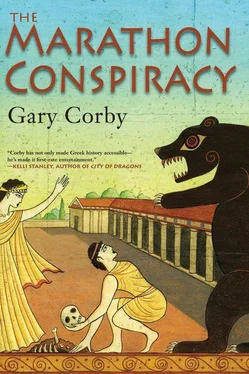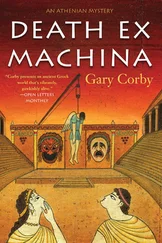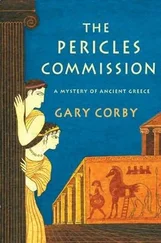Gary Corby - The Marathon Conspiracy
Здесь есть возможность читать онлайн «Gary Corby - The Marathon Conspiracy» весь текст электронной книги совершенно бесплатно (целиком полную версию без сокращений). В некоторых случаях можно слушать аудио, скачать через торрент в формате fb2 и присутствует краткое содержание. Год выпуска: 2014, ISBN: 2014, Издательство: Soho Press, Жанр: Исторический детектив, на английском языке. Описание произведения, (предисловие) а так же отзывы посетителей доступны на портале библиотеки ЛибКат.
- Название:The Marathon Conspiracy
- Автор:
- Издательство:Soho Press
- Жанр:
- Год:2014
- ISBN:9781616953881
- Рейтинг книги:3 / 5. Голосов: 1
-
Избранное:Добавить в избранное
- Отзывы:
-
Ваша оценка:
- 60
- 1
- 2
- 3
- 4
- 5
The Marathon Conspiracy: краткое содержание, описание и аннотация
Предлагаем к чтению аннотацию, описание, краткое содержание или предисловие (зависит от того, что написал сам автор книги «The Marathon Conspiracy»). Если вы не нашли необходимую информацию о книге — напишите в комментариях, мы постараемся отыскать её.
The Marathon Conspiracy — читать онлайн бесплатно полную книгу (весь текст) целиком
Ниже представлен текст книги, разбитый по страницам. Система сохранения места последней прочитанной страницы, позволяет с удобством читать онлайн бесплатно книгу «The Marathon Conspiracy», без необходимости каждый раз заново искать на чём Вы остановились. Поставьте закладку, и сможете в любой момент перейти на страницу, на которой закончили чтение.
Интервал:
Закладка:
“Well, yes, of course. But-”
“It’s not like I won’t be around the home. We’re living in the same place now. He won’t have to travel to school.”
I could already see Socrates scheming to get around her.
“Don’t think this means you get to slack off,” she told him. “The difference between Karinthos and me is, I know what you can do, and I expect you to do it . If I catch you working one bit below your ability, my brother-in-law, I’ll have the slaves beat you.”
“Terrific,” Socrates muttered.
“Do you know your Homer?” she demanded.
“Of course,” Socrates said confidently.
“Excellent. Then we can move on to the good stuff. I think we’ll start with Sappho.”
“Sappho?” Socrates said, aghast. “You want me to learn girlie poetry?”
“All of it.”
“It’ll be good for you, Socrates,” I said, grinning. “It’ll help you later with the girls.”
“Then why don’t you learn it?”
“I don’t need to. I’ve already got a girl,” I told him.
He glared at me.
“Your idea’s brilliant, Diotima,” I said. “I’ll talk to Father about it as soon as possible.”
Diotima rubbed her hands in anticipation. “This is going to be fun.”
Diotima and I drove Aposila to her brother’s farm, to the far northeast. She’d said her goodbyes to Malixa back in Athens, and also to her sons, who by law remained with their father; and so Aposila left with us to begin her new life as a divorced woman.
With Glaucon dead, and with all the talk of who killed Hippias finally dying down, the elections would be free and fair. Pericles was already talking about next year’s vote, making noises about standing again.
It was hard, stony land we rode through. The farms we passed looked as if they could barely scratch a living. When we came to the farm of Theoxotos, I saw it was no different.
I led Blossom into the yard that surrounded the farmhouse. Naked children ran about, the owner’s children and the slave children together. They chased the chickens, which squawked and flew away, and the children laughed. Men and women toiled at their tasks about the yard. They looked up as we arrived. They’d been expecting us.
A man rubbed his hands against his tunic and walked over from where he’d been threshing corn. He stopped before me and said, “I’m Theoxotos, the brother of Aposila.”
“Nicolaos, son of Sophroniscus. I bring you your sister.”
Theoxotos handed down Aposila from the cart. Aposila smiled at me, at Diotima, but said nothing. She walked into the farmhouse.
Theoxotos watched her go in, then said, “We’ll care for her. I know this place doesn’t look much, but no one goes hungry.”
The laughter of the children had told me that. I said, “I know.”
“It was you who helped my sister get her divorce, wasn’t it?”
“Yes.”
“You did her a great service. How much do I owe you?” he asked.
These people were so poor, I didn’t have the heart to take his money. They were poorer than my own family. But like my father, I knew Theoxotos would be a proud man. If I refused to be paid, he’d be more insulted than if I overcharged him.
I searched about the yard desperately for something that might expunge the debt without crippling the owner. Over the other side, I noticed the chicken coop, and stacked beside it, canvas sacks. I had a fair idea what was in those sacks. It gave me an idea.
“Could I have a few of those, please?” I said.
Theoxotos followed my pointing finger.
“You want to be paid in chicken feed?” he said.
“Maybe a few chickens, too, if you can manage it. You see, I’ve started a farm.”
Theoxotos turned to his head slave, whose thin frame stood naked but for a tiny loincloth, his skin burnt by the sun. “Give this man as many sacks of grain as will fit on that cart, and all the chickens he wants.”
“Yes, master.”
He turned back to me.
“Thank you, Nicolaos.”
It was the night of a full moon, always a night of good luck, but this particular moon was especially lucky to me: it was the night I would get married. Married, that is, for the last, final, officially approved time.
My family went on ahead to the house of Pythax, while I remained with my friend Timodemus, who I’d asked to act as best man. His duty would be to drive my bride to her new home. Together we slowly drove the cart through the narrow streets of Athens, taking care to avoid the worst of the mud, to keep the cart clean.
By the time I arrived, my father, my brother, and Pythax were in the courtyard. Diotima and her mother, Euterpe, were upstairs in the women’s quarters. My mother, Phaenarete, had gone up to join them. We men waited for Diotima to make her appearance, and thus begin the ceremony.
There was only one thing missing.
There were no guests.
“What happened?” I whispered to my father.
“We were never able to resolve all the arguments,” Sophroniscus whispered back. “Say nothing, son, for the insult to Pythax is severe, and I don’t wish to make it worse.”
Severe indeed, and Father didn’t need to explain. The respectable families-the friends of Sophroniscus and Phaenarete-had refused their invitations to the home of an ex-courtesan whose new husband was a former slave. The friends of Pythax … well, he had no friends among the citizenry, and all his old friends were slaves.
The door of the women’s quarters opened. All we men-my father, Pythax, Socrates, and I-instinctively looked up to see Diotima standing there, in a dress of flowing red silk. It was the satin she and I had brought back with us from Ionia. Upon her head was a fine yellow veil. Diotima came carefully down the steps, I took her hands, and she smiled at me through the veil. I couldn’t be sure, but I thought her eyes were red.
The courtyard seemed empty with only the seven of us. Every time we spoke, the sound echoed off the walls. It reminded us there were no guests, which no one was brave enough to say, but everyone was thinking. It made us all the more reluctant to say anything at all. Euterpe seemed close to sobbing. She knew the embarrassing no-shows were because of her dubious reputation.
We sat and ate and drank in silence. Very little, for no one had an appetite, except for Pythax, who drank the wine.
Pythax knocked back the last of his wine. “Well,” he said in the echoing room. “You may as well get going.”
I stepped from the house, to check that all was ready. Awaiting us right at the door was the wedding chariot-actually, it was Blossom and his cart-fresh-painted in white with blue facings and decked out in flowers. Holding the reins, ready to transport my bride to her new home, was Timodemus. He favored his good leg, but he was more than able to manage the steady drive. He gave me a broad grin.
The donkey’s mane had been combed and tied in ribbons. The donkey gave me a sour look as I stepped out the door, as if to say his embarrassment was all my fault.
But then I myself stood, stunned. For there, standing in two lines before the donkey, ready to lead the procession, were the Little Bears of Brauron. All of them, decked out in their finest dresses, and since they came of the wealthiest families of Athens, their finest was fine indeed. They’d woven flowers into the braids of their hair, and the moment I emerged they began to sing panegyrics in praise of Artemis.
For the first time ever, the Little Bears had come to lead one of their own to her wedding.
Doris stood to the side.
“You arranged this,” I said to her.
“It was the least I could do,” Doris said.
Standing along both sides of the road was a crowd to admire the spectacle. A sizable crowd that stretched down the street, full of people I didn’t recognize. Then it hit me: the parents of the Little Bears had come to watch their girls, as they should. Euterpe had got her wish: the best families of Athens were here to attend her daughter’s wedding.
Читать дальшеИнтервал:
Закладка:
Похожие книги на «The Marathon Conspiracy»
Представляем Вашему вниманию похожие книги на «The Marathon Conspiracy» списком для выбора. Мы отобрали схожую по названию и смыслу литературу в надежде предоставить читателям больше вариантов отыскать новые, интересные, ещё непрочитанные произведения.
Обсуждение, отзывы о книге «The Marathon Conspiracy» и просто собственные мнения читателей. Оставьте ваши комментарии, напишите, что Вы думаете о произведении, его смысле или главных героях. Укажите что конкретно понравилось, а что нет, и почему Вы так считаете.












